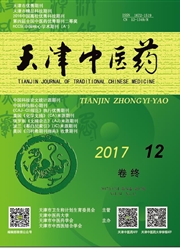

 中文摘要:
中文摘要:
[目的]观察益肾化浊方对阿尔茨海默病(AD)模型大鼠海马区Neurogenin1(ngn1)基因、GFAP和Tubulin蛋白表达的影响,初探益肾化浊方改善AD模型大鼠学习记忆能力的作用机制。[方法]雄性SD大鼠随机分为5组,即假手术组、模型组、益肾化浊方低、中、高剂量组。治疗组给予益肾化浊方低、中、高剂量分别为2.8、5.6、11.2 g/kg,1次/日,共灌胃4周。采用逆转录-聚合酶链反应(RT-PCR)检测海马区ngn1基因表达,蛋白质印迹法检测GFAP和Tubulin蛋白表达的变化。[结果]与假手术组比较,模型组大鼠海马区ngn1基因表达下降,GFAP蛋白表达增加,Tubulin蛋白表达显著下降,差异均具有统计学意义(P〈0.05);与模型组相比,益肾化浊方低、中、高剂量组大鼠海马区ngn1基因表达升高,GFAP蛋白表达减少,Tubulin蛋白表达显著升高。[结论]益肾化浊方可能通过增加AD模型大鼠海马区ngn1基因表达,促进神经元再生,进而改善其学习记忆功能。
 英文摘要:
英文摘要:
[Objective] To explore the influence of Yishen Huazhuo decoction(YHD) on the expression of Neurogenin1(ngn1), GFAP, and Tubulin in hippocampus of Alzheimer's disease(AD) model rats, and try to explore the mechanism of YHD in improving learning and memory of AD rats. [Methods] SD rats were randomized into five groups: sham operation group, model group, low-dosage, mediumdosage, and high-dosage YHD group. The dosage of low, medium, high YHD is 2.8, 5.6, 11.2 g/kg, respectively, once a day, four weeks in total. RT-PCR for ngn1, western blot for GFAP and Tubulin. [Results] Compared with sham operation group, model group rats hippocampus ngn1 gene expression decreased, increased expression of GFAP protein, Tubulin protein expression were significantly decreased, with significant difference(P〈0.05). Compared with model group, three YHD group hippocampus ngn1 gene expression increased, decreased expression of GFAP protein, and increased Tubulin, with significant difference. [Conclusion] YHD might increase ngn1 in hippocampus of Alzheimer's AD model rats, promote neuronal regeneration thereby improving learning and memory function.
 同期刊论文项目
同期刊论文项目
 同项目期刊论文
同项目期刊论文
 期刊信息
期刊信息
